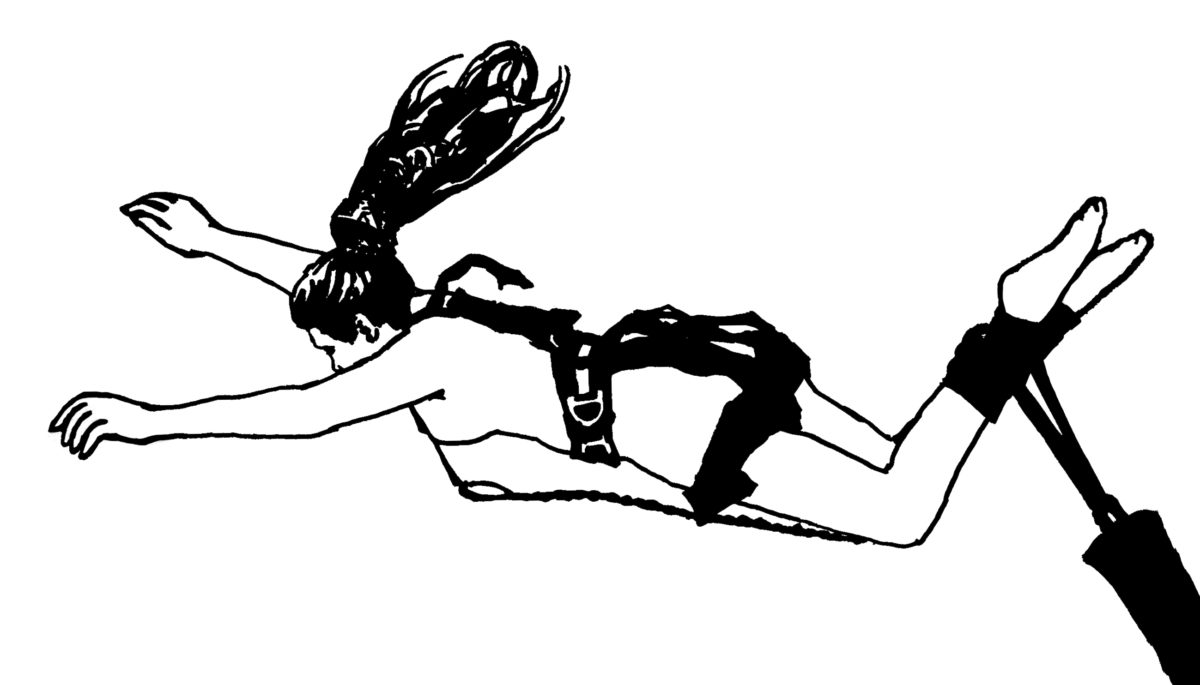Daredevils jumped from 45 metres over Nanaimo River

For the 14th consecutive year, islanders stripped naked and bungee jumped from a 150-foot bridge in Nanaimo to raise money for Mental Health Recovery Partners (MHRP).
The event took place on March 7 and 8 and raised $35 000 for MHRP, an organization which provides programs like peer support and family counselling to “people with mental illness, regardless of their diagnosis.”
Participants in the fundraiser climbed a steep metal staircase wearing, if anything, a towel. They then walked along thick wooden planks to a waiting area where they derobed and a jumpmaster secured a rope around their ankles.
After being helped up onto a small silver platform jutting out from the steel bridge, divers stepped off the edge and plunged toward the Nanaimo River.
Seconds before touching the freezing cold water, the thick white bungee rope tightened and attendees swung from one side of the bridge to the other, some yelled “yahoo!” Others stayed silently thrilled.
Attendees either paid $55 out of pocket or collected at least $200 in pledges to jump.
The naked bungee jump is MHRP’s largest yearly fundraiser, due in part to a donor who matches all contributions up to $40 000.
“I told as many people as I possibly could that I was going to do it so then it became impossible to back out,” said former UVic Professor Nigel Horspool, who leapt from the bridge on March 8.
The retired professor’s collection of $1 025 was matched by MHRP’s donor meaning Horspool’s descent raised a whopping $2 050 for charity.
“I have to admit I did it for the bungee jumping,” he said. “I wanted something that was [going to be] sort of scary but [I knew] would actually be safe. … There’s no real risk.”
Although those that bound off the side of the structure faced no risk of bodily harm, the day was cold, with the sun hiding behind the clouds and the temperature dropping as low as one degree Celsius.
At the top of the bridge, those brave enough to embrace the elements stood naked in the wind. “There’s normally a propane heater up [on the bridge],” said Horspool, “but apparently it got broken in a windstorm. It’s freezing.”
No matter the weather, WildPlay jumpmaster Jacob Dean said people spend less time on the edge when nude.
“It’s a total sensory overload,” Dean said. “People jump pretty quick.”
Formerly named the BC Schizophrenia Society, MHRP sent a total of 88 daredevils over the edge during the weekend. Bungee jumpers travelled from as far as Massachusetts to freefall garmentless.
UVic student Michaela Jasper participated on March 8 for her second year in a row. “I’m still a bit nervous. It doesn’t make it easier being a seasoned jumper,” said Jasper before climbing the steep steel staircase.
Jasper received help through MHRP and wanted to give back so that other people could access their services.
“It can take … months to speak with a psychologist or psychiatrist and sometimes you need something to just walk into … [for] some support and … guidance. MHRP has certainly done that for me,” she said.
According to the Center for Addiction and Mental Health (CAMH), “by the time Canadians reach 40 years of age, one in two have — or have had — a mental illness.”
Statistics Canada reported that in 2017, 4 157 Canadians committed suicide, an average of 11 per day.
Despite increased media coverage, stigma still prevents some Canadians from getting help. A 2016 CAMH survey found “40 per cent of respondents … agreed they have experienced feelings of anxiety or depression but never sought medical help for it.”
Hazel Meredith, CEO of MHRP, said the fundraiser is an opportunity for people to talk about mental health issues and break down barriers for receiving help.
“When people are working the pledge drive they’re having workplace conversations about this event,” said Meredith. “Having people donate … is a really great way to not only raise awareness but also showcase people’s support for mental health journeys and recovery.”
“It takes a community to really champion people and not have people excluded from our society. … Because [mental illness] can be stigmatized. So having people come together for this event, that’s really what we are aiming for,” said Meredith.
Jasper says she is happy to help reduce barriers to mental health services anyway possible.
“I mean if it takes strippin’ down and jumpin’ naked off the bridge to bust some stigma, I’m doing it,” said Jasper.







